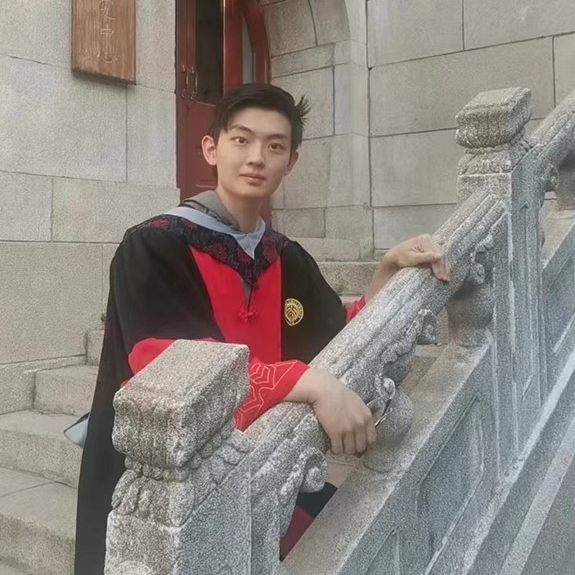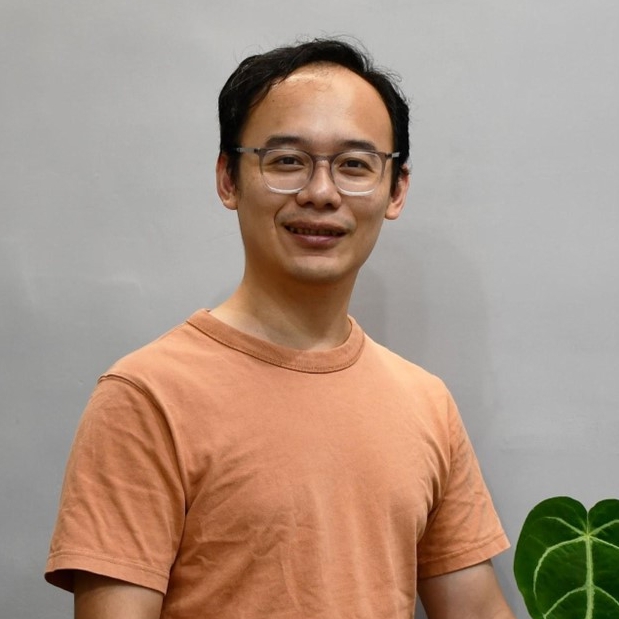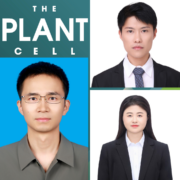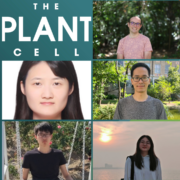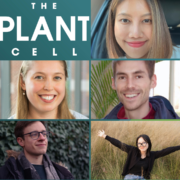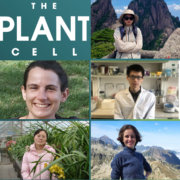The Plant Cell Features June First Authors
Behind the manuscripts are researchers, professors, professionals and students dedicated to advancing the field of plant science. You’ve seen our First Authors on Twitter and Facebook— now, read more about why they chose to pursue plant sciences and click on the links to read their articles.
Peizhe Song
Peizhe Song (he/his) is the First Author of The m6A reader ECT8 is an abiotic stress sensor that accelerates mRNA decay in Arabidopsis published 05 June 2024. He is a Post Doc at Peking University.
Education background includes 2017 BSc Jilin University; 2022 Ph.D Peking University.
Research interests include RNA epigentics. Personal interests include Fitness.
“In my research journey, I have been fortunate to have an inspiring professor who has guided and supported me along the way. Her passion for discovery, dedication to advancing knowledge, and commitment to mentoring have been invaluable in shaping my scientific journey. “
Zhihe Cai
Zhihe Cai (he/she) is the First Author of The m6A reader ECT8 is an abiotic stress sensor that accelerates mRNA decay in Arabidopsis published 05 June 2024. He is a Ph.D student at PeKing University.
Education background includes 2017 BSc PeKing University. Research interests include RNA biology, abiotic stress. Personal interests include Fitness.
“I started to focus on plant science during my undergraduate studies when I took a course in chemical and plant biology. I was fascinated by the complexity and diversity of plant life, and how plants interact with their environment.”
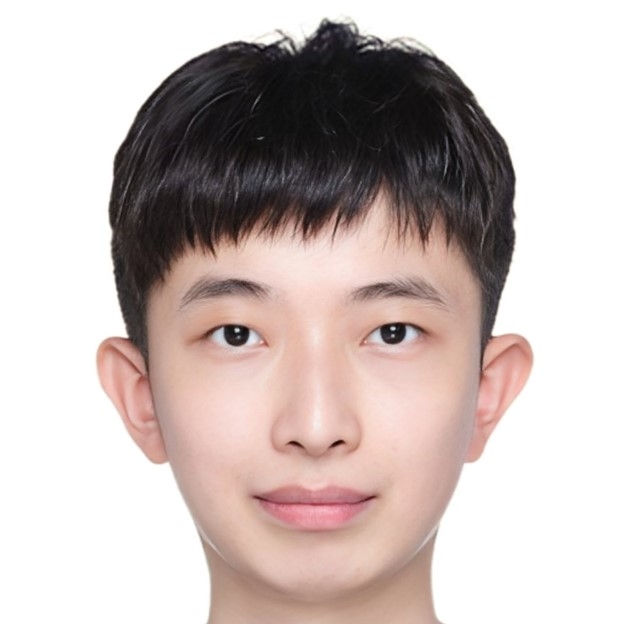 Qian Tang
Qian Tang
Qian Tang (he/his) is the First Author of The m6A reader ECT8 is an abiotic stress sensor that accelerates mRNA decay in Arabidopsis published 05 June 2024. He is a Postdoctoral Researchers at Peking University.
Education background includes a 2022 Ph.D Chemical Biology at Peking University and a 2016 BSc Lanzhou University.
Research interests include Abiotic stress, RNA modification.
Personal interests include Running.
“I think the combination of Epitranscriptomics and plant science helps clarify the mechanisms of responding abiotic stresses in plants.”
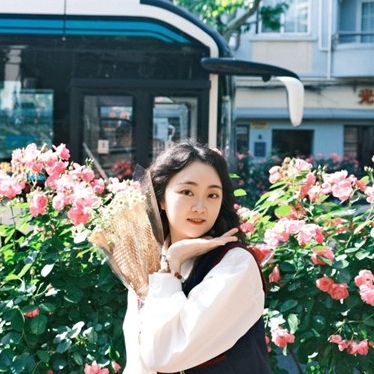 Lu Zhang
Lu Zhang
Lu Zhang (she) is the First Author of Phosphorylated transcription factor PuHB40 mediates ROS-dependent anthocyanin biosynthesis in pear exposed to high light published 06 June 2024. She is a Ph.D student at College of Agriculture and Biotechnology, Zhejiang University.
Education background includes 2019 BSc Horticulture Studies at South China Agricultural University.
Research interests include Light stress, ROS, Secondary metabolism
Personal interests include Dancing, Music and Travel.
“As sessile organisms, plants have difficulty escaping environmental stresses with the same flexibility as animals, so how do they resist it? This piqued my interest. Meanwhile plants provide us with oxygen, food, fuel and fiber, which are a vital resource for human survival, so it’s also important to breed plants that can tolerate environmental stresses caused by climate change.”
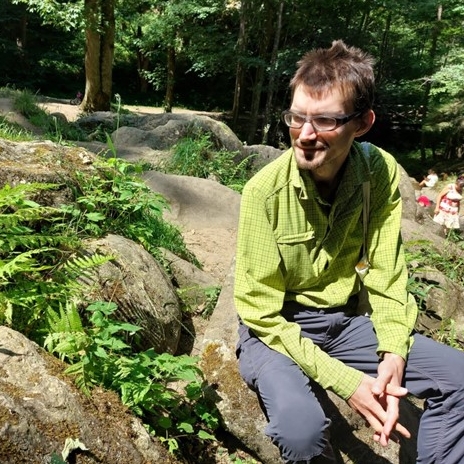 Richard Dorrell
Richard Dorrell
Richard Dorrell (he/they) is the First Author of Complementary environmental analysis and functional characterization of lower glycolysis-gluconeogenesis in the diatom plastid published 06 June 2024. He is a Group Leader, Laboratory of Computational and Quantitative Biology, Sorbonne Université, Paris.
Education background includes a 2024 HDR Université Paris-Saclay; 2014 PhD in Biochemistry University of Cambridge; 2010 BA in Plant Sciences University of Cambridge
Research interests include Chloroplasts, algae, evolution, HGT, oceanography.
Personal interests include Hiking, gardening.
“My parents were 1970s vegetarian hippies, with a big garden. I started growing my first plants when I was 3, and just kept going :-).”
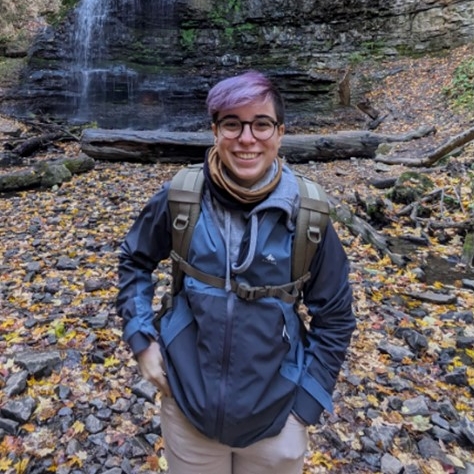 Aude Pouclet
Aude Pouclet
Aude Pouclet (She) is the First Author of Multi-transcriptomics identifies targets of the endoribonuclease DNE1 and highlights its coordination with decapping published 13 June 2024. She is a PhD Student at IBMP CNRS and University of Strasbourg.
Education background includes 2021 MSc in Virology at Strasbourg ; 2018 BSc Molecular and cellular biology at Strasbourg. Research interests include RNA degradation, Endoribonuclease, Decapping, Plant. Personal interests include Hiking, video games, board games, .
“Understanding the mode of action of a catalytically active protein deeply inspires me. Each new discovery adds a piece to the puzzle of understanding its mechanism of action and reveals further areas to explore.”
Foong-Jing Goh
Foong-Jing Goh (he/his) is the First Author of NRC immune receptor networks show diversified hierarchical genetic architecture across plant lineages published 26 June 2024. He is a Ph.D candidate at Academia Sinica and National Chung Hsing University.
Education background includes 2024 Ph.D Graduate Institute of Biotechnology at National Chung Hsing University; 2016 MSc in Botany at Universiti Sains Malaysia; 2012 BSc Plant Biology at Universiti Sains Malaysia.
Research interests include Plant microbiome interaction, Plant environment interaction, Plant biotechnology. Personal interests include Archery, Reading.
“Why do you love plant science? My interest and passion in plants began so early that I can’t pinpoint the exact time or reason. Growing up in Sarawak, Malaysia, I was surrounded by a rich variety of fascinating plants. From a very young age, I was exposed to numerous plant species including different edible crops, fruits and also extraordinary exotic plants. I have relatives with farms and captivating gardens where I could freely explore and nurture my curiosity about plants. When I was pursuing my BSc at university, we were offered the choice to major in microbiology, animal science, or plant science. Without hesitation, I chose plant science. Since then, despite facing numerous challenges and failures in my research projects, I have never regretted my decision to pursue a degree in plant science. I don’t think my love for plants will end anytime soon.”
 Jiorgos Kourelis
Jiorgos Kourelis
Jiorgos Kourelis (He/Him) is the First Author of Bioengineering secreted proteases converts divergent Rcr3 orthologs and paralogs into extracellular immune co-receptors published 26 June 2024. He is a Lecturer in Plant Sciences and Food Security at Imperial College London. Education background includes: 2014-2019 DPhil in Plant Sciences at University of Oxford, 2011-2013 MSc in Biological Sciences at university of Amsterdam, 2008-2011 BSc in Biology at university of Amsterdam.
Research interests include Synthetic biology, Plant pathology. Personal interests include Cycling, socializing, gastronomy.
‘My interest in plant science began during my first year of undergraduate studies in Biology at the University of Amsterdam. This started with a course on plant hormone signaling, where I particularly recall the lectures by Rob Schuurink and Michel Haring, followed by lectures in the second year on signal transduction by Teun Munnik. The molecular mechanisms underlying signal perception and subsequent relay fascinated me. Following up from these courses, my personal interest was in molecular biology and biochemistry, and these courses happened to be all delivered by plant scientists.
I am passionate about plant science because it encourages a broad and integrative approach rather than a narrow specialization. In plant science, one can ask comprehensive questions that span multiple organisms and ecological contexts, rather than focusing on a single organism. Additionally, there is a unique interplay between fundamental research and applied science, where discoveries at the molecular level can have direct and significant impacts on agricultural practices and crop improvement. This dynamic and translational aspect of plant science is particularly fulfilling.
My fascination with understanding the natural world led me to biology, and my undergraduate experiences directed me toward plant science. I undertook an extended undergraduate thesis in Teun Munnik’s group on phospholipid signalling in root development, which motivated me to pursue an MSc focused on molecular plant sciences. Plants, being a fundamental and extensive part of our ecosystems, provide an incredible model to study life sciences, driving my continued passion and commitment to this field.”
 Biying Sun
Biying Sun
Biying Sun is the First Author of Alternative splicing of a potato disease resistance gene maintains homeostasis between growth and immunity published 28 June 2024. He is a pHD student at Nanjing Agriculture University.
Education background includes a 2019 Ph.D Plant Pathology at Nanjing Agriculture University a 2017 MS in Plant Pathology at Nanjing Agriculture University and a 2013 BS in Shanxi Agriculture University.
Research interests include Plant immunity, interaction between pathogen and plants. Personal interests include Running & biking.
“During the master’s program, I started to learn about plant science, mainly participating in the research of plant disease resistance mechanisms in the laboratory. In this process, I gradually understood the impact of different life activities of plants on disease resistance, and gradually became interested in this delicate and robust system.”
Yang Zhou 
Yang Zhou (he/him) is the First Author of CELLULOSE SYNTHASE-LIKE C proteins modulate cell wall establishment during ethylene-mediated root growth inhibition in rice published 29 June 2024. He is a Postdoctor at Institute of Genetics and Developmental Biology, Chinese Academy of Sciences.
Education background includes: 2020 Ph.D in Genetics at University of Chinese Academy of Sciences; 2014 MAgr in Crop Genetics and Breeding at Graduate School of Chinese Academy of Agricultural Sciences; 2011 BAgr in Agronomy at Southwest University (Chongqing).
Research interests include Ethylene signaling, auxin biosynthesis and signaling, hormone crosstalk, plant cell wall.
Personal interests include Singing, photography, hiking.
“When I was preparing my undergraduate thesis in an excellent plant research laboratory, I saw that genetic modification can change plant growth, which was a magical thing for me and attracted me to engage in plant science research. Botany research can help humans create better plant varieties. This study found that plant hormones ethylene and auxin can promote the biosynthesis of xyloglucan and cellulose in the cell wall of rice roots, forming a more compact structure, inhibiting cell wall extension and cell elongation, and thereby inhibiting root growth. How hormones regulate plant plastic growth is an interesting field, and I am happy to explore it with everyone. Many people have given me help, and I am grateful to Professor Jinsong Zhang, Professor Shouyi Chen, and Professor Yihua Zhou, as well as my collaborators.”
Jannis Rinne
Jannis Rinne (he/his) is the First Author of Three Arabidopsis UMP kinases have different roles in pyrimidine nucleotide biosynthesis and (deoxy)CMP salvage published 12 June 2024. He is a Postdoctoral researcher at the Institute of Botany at Leibniz University Hanover.
Education background includes: 2024 PhD Institute of Plant Nutrition at Leibniz University Hanover; 2018 MSc Plant Biotechnology at Leibniz University Hanover; 2015 BSc Plant Biotechnology at Leibniz University Hanover.
Research interests: CRISPR Systems, Metabolic Engineering Personal interests: Strength and Endurance Training, Hiking, Video Games.
“Optimizing plants is crucial to support the needs of a growing world population in the face of future problems like climate change. I want to contribute to solving these problems with my research.”


